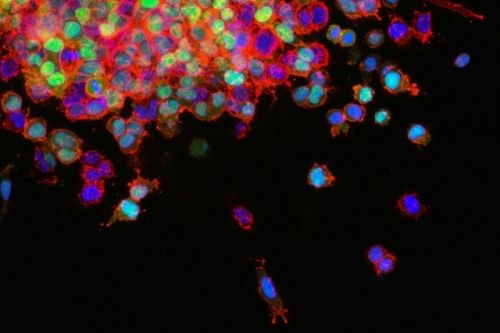A research group at the University of Bologna has identified, for the first time, the specific location and genomic context where DNA breaks occur due to the inhibition of the topoisomerase I, a protein crucial for many biological processes in cells. The results - published in the journal Science Advances - could lead to significant advances in the development of new cancer treatments.
One of the most important functions of topoisomerase I is the regulation of DNA supercoiling. In fact, the DNA molecule is usually folded back on itself several times to fit inside the cell nucleus and is only 'relaxed' at certain times such as during replication and transcription.
This fundamental role in cell life makes topoisomerase I an important target for cancer therapies: its inhibition leads to DNA strand breaks, preventing the replication of diseased cells. This breakdown mechanism was the focus of the investigation led by Alma Mater researchers.
"Using genome sequencing technologies, we were able to map double-strand breaks in DNA across the entire human genome and integrate this data with genomic maps of other important factors involved in the DNA transcription process", explains Giovanni Capranico, professor at the Department of Pharmacy and Biotechnology at the University of Bologna, who coordinated the study. "By integrating and bioinformatically analysing this data, we were able for the first time to define the location and genomic context in which DNA topoisomerase I inhibition-induced breaks occur. We also discovered that this breakage mechanism only occurs at the beginning of the cell cycle phase, when DNA replication occurs".
In short, the results describe a new mechanism by which topoisomerase inhibition induces DNA damage and genomic instability in cancer cells: a discovery that could lead to new cancer therapies.
Published in the journal Science Advances under the title 'Human DNA topoisomerase I poisoning causes Rloop-mediated genome instability attenuated by transcription factor IIS', the study was carried out by the Genomic Instability in Cancer Research Group of the Department of Pharmacy and Biotechnology at the University of Bologna.
The research team under the leadership of Professor Giovanni Capranico and includes Renée C. Duardo, Jessica Marinello, Marco Russo, Sara Morelli, Simona Pepe and Federico Guerra. During the study, Renée C. Duardo (then a PhD student) spent time abroad at the Andalusian Molecular Biology and Regenerative Medicine Centre (CABIMER) and the University of Seville, under the supervision of Professors Andrés Aguilera and Belen Gomez Gonzalez.
The project was supported by national and international funding, including the Italian Association for Cancer Research (AIRC), the AIRC Foundation for Cancer Research, the Ministry of University and Scientific Research, and the NRRP Partnership 6 (HEAL ITALY).

